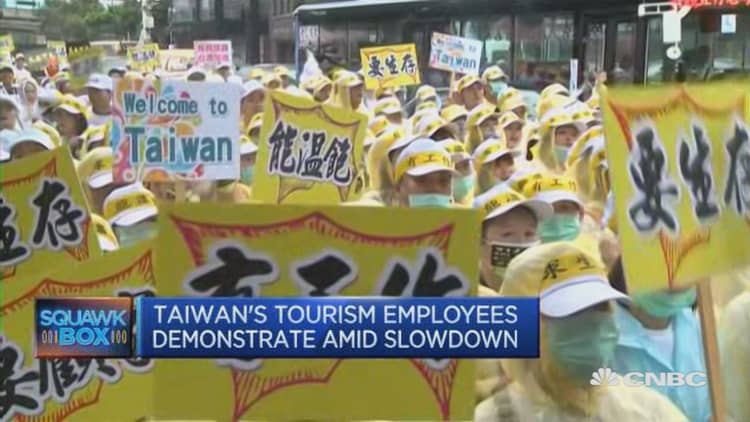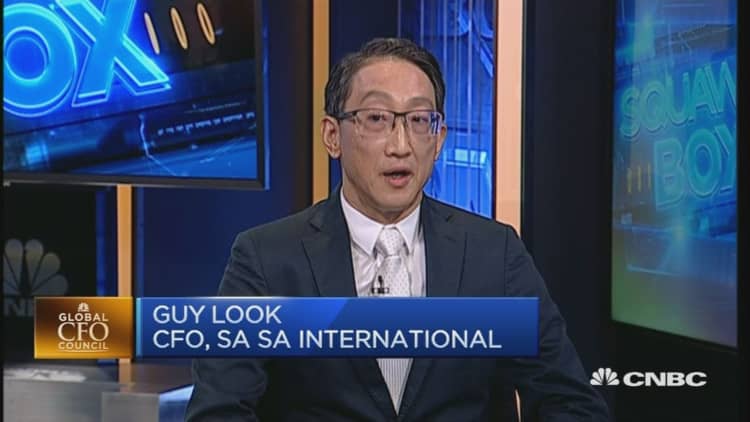
September marks the start of China's peak travel season but traditional hotspot Taiwan is not feeling the love, amid a political stalemate between Beijing and Taipei.
On Monday, about 10,000 Taiwanese tourism workers took to the streets, calling on the government to improve the situation, just ahead of a key period for the industry: the Mid-Autumn Festival long weekend in China, which started Thursday, and the week-long National Day holiday that starts on October 1.
The Taiwan Tourism Bureau said the number of Chinese visitors who came to the country as part of a tour group fell 8 percent from January to July, even as total overseas visitor numbers grew 7.9 percent from a year ago to 6.3 million. In contrast, the number of individual travelers from the mainland rose 14 percent from January to July.
The fall in group traveler numbers was particularly significant for Taiwan because holidaymakers in tour groups tended to spend more days at different places in Taiwan.
"Even if the number of tourists from South Korea increase by 100 percent, it could still not make up for 5 or 10 percent decrease in the number of tourists from the Chinese mainland," said Taiwan's Travel Agent Association spokesperson Ringo Lee said at the protest.
Numbers from Taiwan's Mainland Affairs Council backed up the picture of a broad slump, showing there were 15 percent fewer visitors from mainland China in July alone, while overall Chinese visitor number growth from January to July was just 0.5 percent higher than the same period a year ago.
The slide in mainland visitor came on the back of the cooling relationship between Beijing and Taipei, caused by Taiwan's election of pro-independence campaigner Tsai Ing-wen as president in January.
Tsai has yet to acknowledge the "One China" policy under a framework called the "1992 Consensus," which is a a tacit understanding China claims was reached between the two governments in 1992 that acknowledged there was only one China, although the mainland and Taiwan could have their own interpretation of what that meant.
China has made Tsai's acknowledgement of the existence of the One China policy under the 1992 Consensus a non-negotiable requirement in order for the countries to resume the friendlier relations they had under her predecessor Ma Ying-jeou.
China and Taiwan parted ways in 1949, when the Nationalist Party was forced to retreat to Taiwan by the Chinese Communist Party. No armistice or peace treaty has ever been signed and China views the territory as a renegade province that can be re-taken by force if necessary.
China's Taiwan Affairs Office blamed Monday's tourism industry protest on Taipei's refusal to acknowledge the 1992 Consensus.
"Whoever caused the situation should end it," said the office's spokesperson Ma Xiaoguang on Wednesday.
On Chinese social media site Weibo, news of Monday's protest was met with broadly nationalistic comments.
"Not travelling to Taiwan at this time will be taking concrete action to protest against independence in Taiwan...It's nice to choose to travel within (mainland) China too," posted Mole1940.
"Let's not travel to Japan, South Korea and Taiwan! The two countries are against China while Taiwanese leaders do not recognize the 1992 Consensus; Let's not go and add to their wealth," wrote Autumn Firefly.

The frost between China and Taiwan comes as a record 133 million Chinese tourists are expected to travel outside the mainland in 2016, an increase of 11.5 percent on 2015, according to an early September report by the China Tourism Academy and UnionPay International. The top destinations for these travelers were Hong Kong, Macau and Taiwan, followed by Thailand, South Korea and Japan, according to the report.
"The outbound market has evolved from the early days of sightseeing and shopping to slow, leisure- and destination-focused experiential travel," the report said.
That changing focus has already been noted by Hong Kong retailers, which in the past relied on big-spending Chinese visitors for sales.
The number of Chinese visitors to Hong Kong grew in July, the first monthly increase in more than a year. But their once-legendary free-spending has tapered off, according to retailers. Hong Kong's retail sales overall have declined for 17 straight months.
"While the stabilization in mainland Chinese arrivals has been quite clear ... it seems that they're spending less on a per capita basis," Guy Look, chief financial officer at well-known Hong Kong beauty retailer Sa Sa, told CNBC this week.
"I think basically they are spending more on experiencing during traveling, they're probably spending a bit more on hotel accommodation, spending more on peak trams, enjoying themselves and not just buying things," he added.
- Leslie Shaffer contributed to this report.

